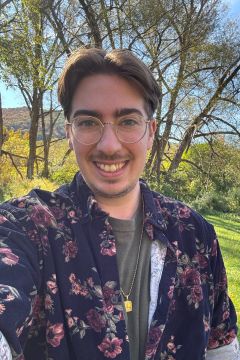
Guest post by Leo Richardson
It is my pleasure to introduce you to people whose lived experiences will help you better understand what it is like to be transgender or the parent of someone who is.
Each year during November 13-19, before Transgender Day of Remembrance on November 20, people and organizations around the United States observe Transgender Awareness Week to help raise the visibility of transgender people and to address the issues members of the transgender community face (GLAAD). While I can bring awareness to topics regarding parents of transgender children, like how coming out isn't one day, I can't speak to matters that directly impact transgender people.
I've written extensively about my son Leo on this blog. I'm excited to have him sharing why this year, more than ever, the transgender community needs visibility and awareness.
Coming Out, Community, and Continuing the Fight
I came out during the tailwinds of President Obama’s second term, as one of the first in my peer group to do so publicly at our small liberal arts college.
The national cultural conversation about transness was just beginning, and representation was still very limited. According to a GLAAD report, only 16 transgender characters appeared across the three main streaming services—Netflix, Hulu, and Amazon—during the 2016 television season.
I became the go-to person for even the loosest of acquaintances who had questions about their gender. I would always begin by recommending local resources, such as the clinic where I went to access hormone therapy and counseling services.
Ultimately, the question would come up.
“How do you handle it?”
The issue at hand isn’t just one silent matter—transphobia—but a complex web of interpersonal dynamics, legal challenges, and the ongoing effort of simply surviving in the face of it all.
Navigating the early stages of my medical transition was quite difficult. My first year was particularly grueling, as the excitement of being in the process was often overshadowed by the reality of not passing well. Few institutions had developed policies on how to navigate trans students, patients, and community members, and I lacked trans mentors to guide me. During that time, “handling it” looked a lot like sitting in meetings with administrators and peers to create inclusive policies, finding support from online communities of trans people, and grieving lost connections with people who rejected me. It also involved writing emails to professors, begging them to use my chosen name during the first-day roll call, and supporting my peers as they began their transitions. The only way forward was to take it one day at a time, constantly reminding myself that better days would come. And they did.
These days, I can “handle it” by taking action as much as possible. I am an active mentor to LGBTQIA+ students. I have trans friends and family. I also keep educating myself about the issues affecting the most vulnerable in the trans community. This way, I can use my privilege as a white male-presenting person to advocate for their safety and support their needs.
I show up as a valued member of my community first, and as a trans person second. This is often confusing to bigots who only know me as a “good man with a strong work ethic.” They’ve already humanized me, and reflecting on this could prove the first step towards dismantling their tower of ignorance.
News coverage that highlights the decrease in Gen Z identifying as transgender or gender-nonconforming frequently overlooks the impact of government regulations on this issue. These regulations will undoubtedly result in individuals concealing their identity or postponing medical treatments for their protection.
These people in our community are who I think about most during Trans Awareness Week: those who must “handle it” by not acknowledging it at all. It is essential that we strive for a nation where every individual has full autonomy over their body, free from government interference. To achieve this, we must continue our fight for equal rights and protections for the trans community.

Leo Richardson is the owner and CEO of Richardson Works LLC, a digital communications and marketing firm based in western Vermont. His work has supported businesses in higher education, substance abuse prevention, and hemp manufacturing. He holds a Bachelor of Science degree in Media and Communication from Castleton University (now Vermont State University Castleton), where he met his loving husband, Andrew. Leo can be found roving through thrift stores and art galleries in the northeast, and at richardsonworks.org.
Subscribe to get my latest content by email, and I'll send you SIX questions to ask yourself before sharing that your child is transgender: because it can be a little overwhelming and sometimes you just need to know where to start.
We hate SPAM. We will never sell your information, for any reason.

